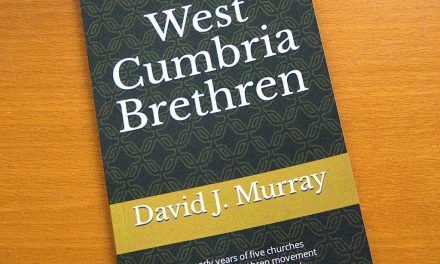In my previous post, about a book on shorebirds that I bought for myself this Christmas I also mentioned two books that I had received this Christmas. It’s not always easy to select books as gifts for other people. I suppose I’ve got that wrong as often as right in the past. However, these two were just right for me at the present time. Firstly, Forty Farms by Amy Bateman.

I’m only a short way into this, having read about only six of the forty Cumbria farms, but what I’ve read so far is the best thing I’ve read on the challenges of rural Cumbria in many a long year. Amy Bateman allows the farmers themselves to tell their story. Each is a different personality and each cares for a different farm – different not only in location but also in character.
Far too often these days environmental enthusiasts portray farmers as the guilty parties destroying the landscape. They frequently seem to forget that these are the people (women and men) who make it possible for them to eat. The rewilding gurus, so it seems, would rather bring food from far away, forgetting that long-distance transportation is not “green”.
Already in the chapters I’ve read I’ve been briefed by people at the “coalface” so to speak on the pressures of legislation, regulation and “advice” that betray a severe lack of understanding of the complexities of the Cumbrian upland economy. Bureaucratic enthusiasm for the latest environmental fads, pushed on Lakeland farmers with little or no consultation, has for many years seemed to me to be a sure way to the decline of vast stretches of our beautiful county. And this will not only be a decline of the agricultural economy but also in the long run a decline of tourism as once food production is killed off who are going to be the landscape beauticians?
Ever since I was involved for several years as a consultant on tourism and other economic and political challenges of Cumbria in the mid-1980s I have felt repeatedly that things are going in the wrong direction due to naive interference by officialdom. In contrast against their training in intellectual monocultures, integrated positive thinking is more likely to be found in a group of farmers. They know that changes are inevitable, and indeed are necessary but they must be changes that do not destroy what they seek to conserve.
So thank you, Stephen, Sandy and family, for introducing me to this remarkable book. Oh, and did I forget to say, the photography is superb. I wish my bird photographs were as good as Amy Bateman’s landscapes.
My second book, thanks to Nigel, Sue and family is much less controversial and very welcome. It’s about food, the Booths Glorious Food Cookbook. The recipes in here look wonderful. I’ve already tried one of them since I returned home.

Next in line I think will be this salmon recipe. I happen to have a fillet in the freezer. Or maybe I’ll do the mashed potatoes with Harrogate Blue. That sounds mouthwatering.

Should I mention the family connection to Booths? Well, why not, even if rather cryptically. Maybe this is a way of getting dad to return to shopping at The Good Grocer even if the nearest branch is at Keswick.




